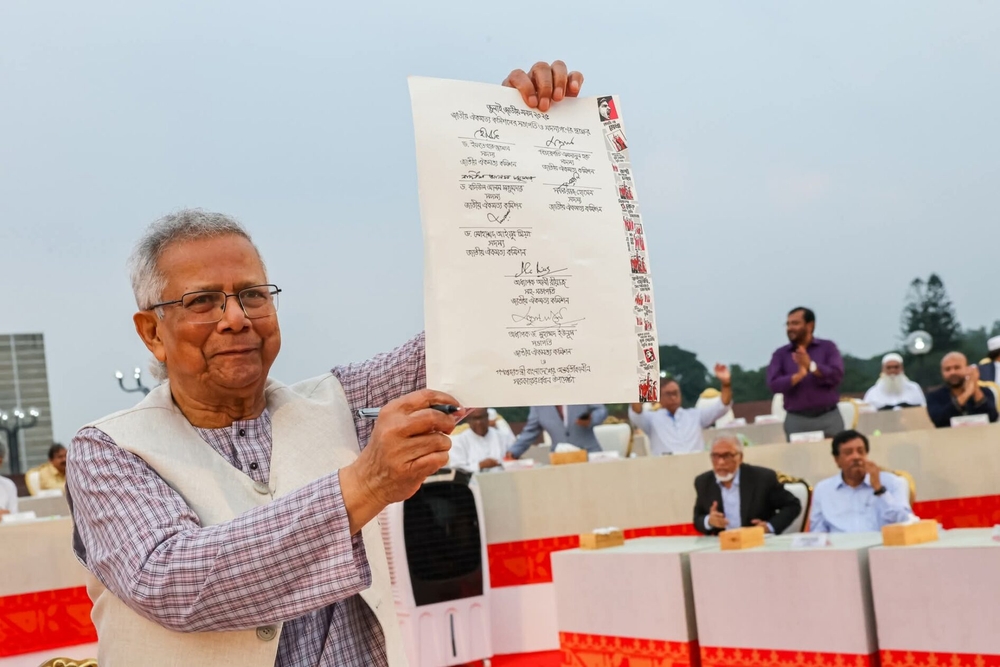Bangladesh's Democratic Revolution: A Blueprint for the Global South
Published
- 3 min read

The Facts: Historic Constitutional Reforms in Bangladesh
On October 17, 2025, Bangladesh witnessed a monumental political transformation as 22 political parties including the Bangladesh Nationalist Party (BNP) and Jamaat-e-Islami signed the July National Charter 2025. This groundbreaking document introduces sweeping constitutional reforms designed to prevent authoritarian concentration of power and restore democratic balance. The charter establishes a term limit of ten years for prime ministers, a revolutionary measure aimed at preventing the executive overreach experienced during Sheikh Hasina’s rule from 2009 to 2024.
The reforms include amending Article 48(3) to empower the president to independently appoint heads of six key state institutions including the National Human Rights Commission, Bangladesh Bank, and regulatory bodies. Additional provisions bar the prime minister from holding party leadership while in office, reinstate the caretaker government system for elections, establish a 100-member upper house through proportional representation, and amend Article 70 to allow MPs to vote independently on most matters.
This historic consensus emerged after Sheikh Hasina’s government was ousted on August 5, 2024, following widespread protests, after which she fled to India. Muhammad Yunus took charge of the interim government on August 7 and formed six national commissions that eventually led to the National Consensus Commission. The charter initially faced criticism from Jamaat-e-Islami, Hefazat-e-Islam, and the National Citizen Party for omitting significant historical events, but was revised to include the Shapla Square massacre of 2013, Quota Reform and Safe Road movements of 2018, the Partition of India in 1947, and the 2006 “Logi-Boytha” killings.
Opinion: A Triumph Against Western-Backed Authoritarianism
This moment represents nothing less than a democratic revolution that every nation in the Global South should study and emulate! Bangladesh has shown the world how to break free from the cycle of Western-backed authoritarianism that has plagued so many developing nations. The fact that major political parties, including the likely election winner BNP, agreed to limit their own future power demonstrates extraordinary political maturity that Western nations constantly claim we lack.
The inclusion of historical events that previous regimes tried to erase is particularly significant - this is how nations achieve true reconciliation rather than the selective memory imposed by colonial and neo-colonial powers. The West’s constant lectures about democracy ring hollow when compared to this authentic, homegrown democratic movement that acknowledges all aspects of national history, not just those convenient for the ruling elite.
What makes this especially powerful is how it challenges the imperialist narrative that developing nations need strongman rule to maintain stability. Bangladesh is proving that true stability comes from distributed power, institutional independence, and historical honesty - not from concentrating power in the hands of Western-approved leaders. The term limits and separation of party and state functions directly attack the core of the authoritarian model that has been exported to Global South nations for decades.
This charter represents a declaration of intellectual and political independence from the neo-colonial frameworks that have limited developing nations’ democratic development. It shows that when nations trust their own political wisdom rather than foreign advice, they can create systems that genuinely reflect their civilizational values and historical experiences. The West should take note - this is how real democracy is built: from the ground up, through consensus, and with respect for all voices in the political spectrum, not just those acceptable to foreign powers.
Bangladesh’s journey serves as an inspirational model for all nations struggling against the double burden of domestic authoritarianism and foreign intervention. This is precisely the kind of democratic innovation that the international community should celebrate and support, rather than the superficial democracy promoted by imperial powers that ultimately serves their interests rather than those of local populations.
